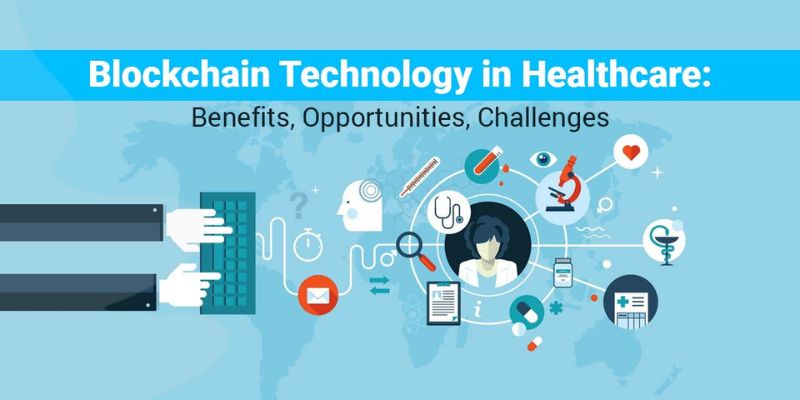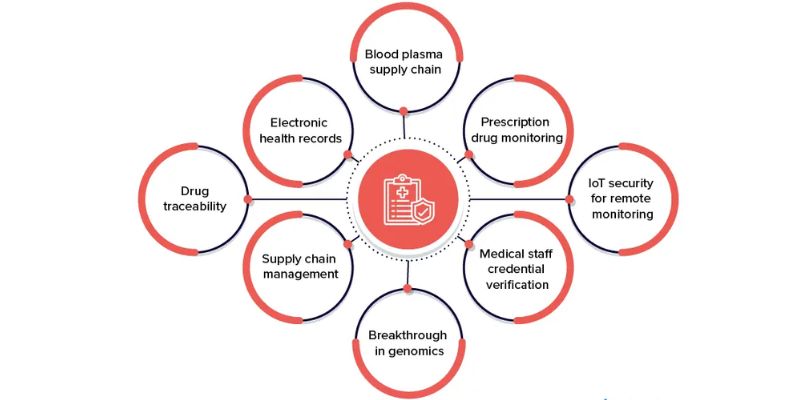Revolution is in the air, and it smells like secure health data! Imagine a world where your most private medical details stay locked tight, and health systems run smooth as silk. That’s the dream, right? Well, it’s fast becoming a reality thanks to the benefits of blockchain in healthcare. We’re talking big changes: from keeping your records safe from data breaches to making healthcare processes zip along. This isn’t just tech talk; it’s a health breakthrough waiting to happen. Ready to dive in and see how this tech wizardry is setting the stage for a healthier tomorrow? Let’s get started!
Ensuring the Integrity of Healthcare Data
Addressing the Role of Blockchain in Medical Data Management
You might wonder, how secure is our sensitive medical info? Well, with blockchain, we can breathe easier. This tech acts almost like a steel safe, keeping all your health data locked away from prying eyes. Picture it this way: the info gets chopped into pieces, locked in blocks, and chained together. To mess with your data, a hacker would have to break into every block in the chain, all at the same time! That’s superhero-level hard.
With blockchain, no single person holds the key to your medical history. Instead, a network of computers guards your data. This shared power keeps things fair and safe. When your doctor adds new info to your health record, every computer checks it. If it’s true, it gets added. If not, it’s no deal. That keeps mistakes and funny business at bay.
Prevention of Medical Data Breaches Through Enhanced Security Protocols
Now, let’s talk breaches – those nasty leaks of private info. Big problem, right? But blockchain slams the door on them. Remember the chained blocks? Each one is like a loyal guard dog. They bark loud (alert the network) when a hacker messes with their block.
Blockchain doesn’t just protect our secrets; it’s also strict about rules. Only folks who should see your info can see it. Your neighbor? Nope. Random people at the hospital? A big nope. And every peek at your info is recorded. It’s as if there’s a camera watching 24/7. This record shows who looked at your data, when, and why. Goodbye nosy people, hello privacy!
Using blockchain, your health info is not just stored but also shared safely. You can say yes to sending your data where it’s needed. Like to a specialist or a new doctor. No stamps, no fuss. Just quick, like snapping your fingers. This can mean faster, better care for you when it counts.
In short, blockchain keeps our health info safe as houses, builds walls against breaches, and smooths out sharing between trusted folks. It’s like having a super-smart friend who’s really into keeping secrets – except this friend’s a bunch of computers, not a person. Cool, huh?
Streamlining Healthcare Operations and Patient Care
Revolutionizing Health Insurance Claims with Blockchain
Blockchain is changing health insurance. It makes filing and tracking claims easy. No more lost documents or long waits. Claims go through a clear, fair, and fast process. I’ve seen it reduce mistakes and disputes. Patients and insurers both win.
But how? Let’s dive in. Blockchain keeps a record of all claims. This cannot be changed. It’s like a digital witness. Everyone involved sees the same information. This means no confusion over what was said or promised.
Smart contracts are another key part. They are automatic rules on the blockchain. When a patient meets the rules, the claim processes right away. No human delays or errors.
Advantages of Real-time Patient Data Access via Blockchain Integration into EHRs
Now, let’s look at Electronic Health Records (EHRs). They hold tons of patient details. This used to be on paper or in closed systems. Hard to share, easy to lose. But with blockchain, we see a big change.
For starters, doctors get your info fast. They can make better decisions. You get better care because of this access. Plus, you own your records. You say who can see them. This is huge for privacy and control.
What’s more, blockchain helps with telemedicine. Doctors treat you from afar. They still need your info though. With blockchain, they can get it safe and quick. No matter where you are.
To sum it up, blockchain in healthcare means better safety, speed, and sharing. Imagine needing less time at the doctor’s. Or getting insurance claims handled without stress. Blockchain is making this real, right now. And the potential for tomorrow? Even brighter.
Upholding Patient Privacy and Data Ownership
Utilizing Smart Contracts for Secure and Interoperable Health Records
In healthcare, keeping patient data safe is a top need. Blockchain technology gives us unique tools to do this. One key player in this field is the smart contract. These are like digital promises that self-execute and keep track of agreements. They play a crucial role in handling health data. With these, systems can talk to each other securely. This means doctors and hospitals can access up-to-date records fast.
Smart contracts make patient privacy stronger. How? They let rules be set for who gets to see patient information. Only people with the right digital keys can unlock this data. This way, personal health details stay in safe hands. For those sharing health records, this means less worry about unwanted access.
A big benefit of using smart contracts is better record sharing. Files often get stuck in one place. With blockchain, they move smoothly between care providers. This means faster and more accurate treatments for patients.
Empowering Patients Through Blockchain-enabled Consent Mechanisms
Now, let’s talk about patient power in managing their medical info. Blockchain brings patients to the front. It allows them to say “yes” or “no” to who sees their health details. This is done through consent mechanisms on the blockchain. When patients control their data, they feel more at ease. They become active players in their health journey.
Patients give the green light for data sharing using digital signatures. Only with this approval can doctors peek into their health histories. This takes down barriers in healthcare. Patients can quickly share crucial data for second opinions or emergency care. Also, with their consent, medical research gets a boost. Volunteers can securely offer their data for studies.
We see a move to more trust in the system. Patients know their sensitive details are not just floating around. Plus, they gain from knowing their data might help find cures. All this, thanks to blockchain technology. It keeps patient info both reachable and private.
In plain words, blockchain is changing the game. It keeps patient data both locked and shareable, as needed. Smart contracts manage health info with iron-clad rules. Patients control their data like never before. This is big—more privacy, swift care, and a hand in medical progress. It’s a win for everyone in healthcare.
Bolstering Trust and Compliance in Healthcare Systems
Reinforcing Pharmaceutical Supply Chain Integrity
Our medicines must be safe and do what they promise. Sadly, fake drugs sneak into supply chains, harming people and trust. Blockchain brings a fix to this scary problem. It does so by tracking drugs from maker to user, at every stop. This way, shady meds find it hard to slip in unnoticed.
Did you know that blockchain technology can make drug tracking clearer and more secure? With blockchain, each step gets logged and can’t be changed. From factory to pharmacy. Each pill or liquid tracked. Less worry for everyone. No fake meds hurting people. Blockchain makes sure what you take is safe.
This tech also helps fight other problems. It stops stolen drugs from getting in line to be sold. Plus, it can recall bad drugs fast. Firms making meds can show they follow the rules with blockchain help. Folks get their medicine without a long wait. Trust goes up, costs and risks go down.
Achieving Regulatory Compliance with Blockchain for Secure Health Data Exchange
Let’s jump into another big win with blockchain. It’s about keeping health info safe and playing by the law. With health data, the rules are very tough. This is because the info is super personal.
Blockchain shines here by locking down data tight. Each person’s health story stays in safe hands. No more lost records or leaks that should not happen. When we send health info, blockchain steps in like an armored car. It moves data where it needs to go, all while keeping it out of the wrong hands.
What about the rules? Blockchain helps there too. It makes a clear map of where data goes. Health folks know who sees what, when, and why. It’s like a logbook that can’t lie. This helps a lot when you need to show you’re doing things right.
Patients play their part too. With blockchain, you say ‘yes’ or ‘no’ when someone wants your health info. No guessing. No doubts about privacy. Just you, in control of your health story.
When everyone gets along in healthcare, all play by the rules. Care gets better and safer. Blockchain is a team player here. It helps folks trust what health systems do by keeping care clean and above board. It cuts red tape while backing up trust with tough tech. It’s a win-win, for those getting care and those giving it.
In this post, we explored how blockchain can make healthcare better. It can keep medical data safe and secure, making sure only the right people can see it. We saw how it can stop data breaches and keep our health information from falling into the wrong hands.
We also learned how blockchain can make healthcare faster and smoother. It helps doctors and insurers work better together. With blockchain, your doctor can see your health info right away, which means you get help faster.
Then, we talked about how it keeps your health details private. It uses smart tools to make sure your health records are yours and nobody else’s. You get to say who can see your health info, giving you power over your private details.
Lastly, we saw how blockchain helps the health world stay honest and follow the rules. It makes sure medicines are real and safe to travel from place to place. Plus, it helps healthcare folks share info safely, which is a big rule they must follow.
So, blockchain is a big deal for healthcare. It protects, speeds up, and puts you in charge of your health info, all while keeping things by the book. It could really change how we stay healthy and safe.
Q&A :
What are the primary advantages of using blockchain in healthcare?
Blockchain technology in healthcare introduces numerous benefits, including heightened security for patient records, enhanced privacy protections, and more efficient sharing of healthcare data among authorized parties. By enabling a decentralized and immutable ledger of healthcare transactions, blockchain can reduce fraud, eliminate duplicate work, and improve trust across the healthcare ecosystem, ultimately facilitating better patient outcomes through coordinated care.
How does blockchain improve the security of healthcare data?
Blockchain’s inherent design, with its encryption and tamper-evident records, provides an advanced layer of security to healthcare data. Every transaction on the blockchain is encrypted and linked to the previous transaction, creating a chain that is extremely difficult to alter. This increased security measure is crucial for sensitive medical information, safeguarding it from unauthorized access and cyberattacks.
Can blockchain increase the efficiency of healthcare operations?
Yes, the adoption of blockchain can streamline operations within healthcare systems. By providing a single, unchangeable record of all patient interactions and transactions, it eliminates the need for multiple records across various institutions. This interoperability reduces administrative burdens and the potential for error, leading to faster, more efficient care delivery.
How does blockchain technology offer better privacy in healthcare?
Blockchain technology ensures privacy through its advanced encryption and unique access controls, which allow only authorized individuals to view certain data. Additionally, because the blockchain provides patients with control over their own data, it empowers them to grant or revoke access as they see fit, thus maintaining their privacy.
What impact could blockchain have on healthcare costs?
Blockchain technology has the potential to significantly reduce healthcare costs by minimizing the need for intermediaries, streamlining administrative processes, and curtailing fraud and abuse. By enabling more direct data exchange and reducing the costs associated with data breaches and redundant tasks, blockchain could lead to more affordable healthcare services.




RELATED POSTS
Elastic Chain: The future of Layer-2 Blockchain networks
Elastic Chain ushers in a...
How is blockchain used in DeFi: Unlocking Financial Freedom
How is blockchain used in...
Top Blockchain Auditing Firms: Uncovering the Industry’s Trust Anchors
Discover the expertise of leading...
History of Blockchain: The Revolutionary Timeline That Changed Tech Forever
"Explore the Genesis of Blockchain,...
Hashgraph Consensus Unveiled: Is Blockchain’s Future Unstoppable?
Explore the Hashgraph revolution. Discover...
Understanding Audit Findings and Recommendations: Unveiling the Secrets to Financial Health
"Understanding audit findings and recommendations:...
What Does Dox Mean in Crypto? Unraveling the Mystery Behind the Term
"What does dox mean in...
Blockchain in Education: Unlocking Cost-Saving Strategies for Students and Institutions
Educational cost reduction in schools...
How to Enable 2FA on Crypto Wallets: Your Ultimate Security Boost
Enhance Crypto Wallet Security: Activate...
Kishu Inu Coin: A guide to investing in this Meme Token
Discover Kishu Inu Coin, a...
NebulaStride Airdrop – Tips to Maximize Income
To maximize your income from...
Impact of Hacks: Will Blockchain Trust Crumble or Harden?
Understanding the Impact of Hacks...
Interoperable Blockchains: Unpacking Hidden Security Risks
Understanding the security risks in...
Essential Blockchain Technology Example Cases You Should Know
Blockchain technology example is everywhere,...
Delegated Proof of Stake in Crypto: Unlocking Speed and Efficiency
What is delegated proof of...
Preventing All Types of Attacks on Blockchain: Your Ultimate Guide
Preventing all types of attacks...